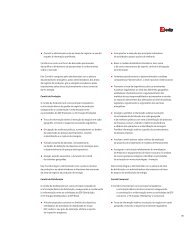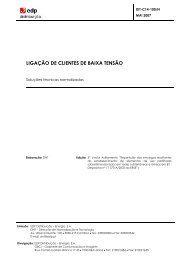business plan for 2004 - EDP
business plan for 2004 - EDP
business plan for 2004 - EDP
You also want an ePaper? Increase the reach of your titles
YUMPU automatically turns print PDFs into web optimized ePapers that Google loves.
context. A growth of very close to 3.0% is <strong>for</strong>ecast <strong>for</strong><br />
<strong>2004</strong>, while the Euro Area is still endeavouring to<br />
reverse the trend of slow economic growth seen during<br />
the past two years.<br />
Together with the dynamism of the Spanish economy,<br />
prices have risen at a rate greater than that of the Euro<br />
Area, slightly more than 3.0%. This is not likely to<br />
change significantly in <strong>2004</strong>, even though the downward<br />
tendency will continue. The acceleration of growth of<br />
the Spanish economy would not seem, however, to be<br />
sufficient to reduce unemployment. Despite the fact that<br />
the unemployment rate increased in the Euro Area,<br />
Spain continues to have an unemployment rate far<br />
higher than the European average, more than 11.0%. A<br />
slight decline of the unemployment rate is expected <strong>for</strong><br />
<strong>2004</strong> , though a figure of less than 11.0% will be difficult<br />
to achieve.<br />
>> 3 Brazilian Economy<br />
During 2001 and 2002 Brazil experienced a series of<br />
events that had a negative effect on its economy,<br />
particularly the international surroundings, heightened<br />
by the troubled situation in several of the major<br />
economies of Latin America. Internally, the Brazilian<br />
economy was significantly affected by energy rationing<br />
and by the uncertainty surrounding the results of the<br />
presidential elections and the consequent economic<br />
policies.<br />
The end to most of the troublesome factors and signs of<br />
the adoption of an economic policy based on stability<br />
have led to more optimistic expectations surrounding<br />
the growth of the economy in <strong>2004</strong>, at about 3.0%,<br />
though growth in 2003 will have been no more than<br />
1.5%, similar to the figures seen in 2001 and 2002. Price<br />
increases in 2003 stood at about 15%, substantially<br />
higher than the figure of no more than 8.5% in 2002.<br />
Inflation<br />
4.000<br />
3.500<br />
3.000<br />
2.500<br />
2.000<br />
1.500<br />
1.000<br />
0.500<br />
0.000<br />
Jan-03 Feb-03 Mar-03 Apr-03 May-03 Jun-03 Jul-03 Aug-03 Sep-03 Oct-03 Nov-03 Dec-03<br />
As a result of the end to the instability seen during 2001<br />
and 2002 and of the positive expectations <strong>for</strong> the future,<br />
the real recovered slightly in 2003 from the sharp<br />
depreciation against the dollar and the Euro in 2002.<br />
Influenced by the appreciation of the European currency,<br />
the per<strong>for</strong>mance of the real against the dollar was better,<br />
and this was particularly important given the greater<br />
relevance of the dollar to the Brazilian economy.<br />
Euro Exchange Rates<br />
6.8%<br />
8.4%<br />
4.4% 3.7%<br />
2.8%<br />
2.3%<br />
BRL Currency EUR Currency<br />
3.6%<br />
2.3%<br />
15.0%<br />
3.3%<br />
3.2%<br />
2.1%<br />
2001 2002 2003<br />
Portugal Spain Euro Area Brazil

















